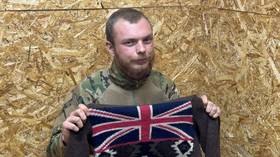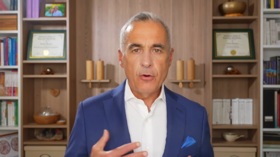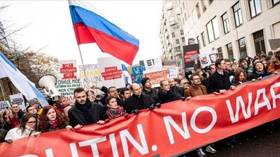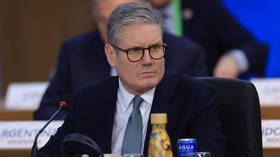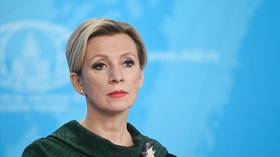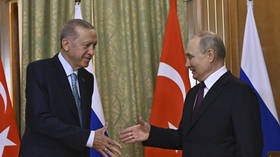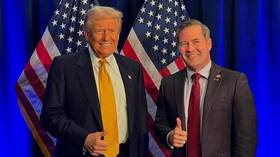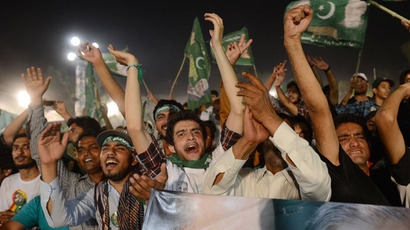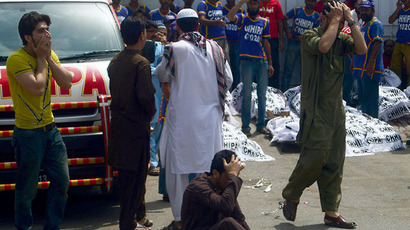Sharif claims early victory in Pakistan election, poised for third term
Former Pakistani Prime Minister Nawaz Sharif, ousted 14 years ago in a military coup, has claimed victory in the country's landmark democratic election, securing at least one-third of the seats in the national legislature, according to early results.
Of the 86 millions of Pakistanis eligible to vote, some 60 percent turned out to polling stations despite threats of violence from the Taliban.
“If this election was between despair and defiance, defiance did win,” said RT correspondent Lucy Kafanov, who was following the events in Pakistan. “People did turn out in droves. We saw immense excitement at the polling stations.”
The Pakistani Taliban assailed what they called an ‘anti-Islamic election,’ killing over 30 people in a series of blasts and gun attacks on polling stations across the country. Despite the chaos, the Election Commission commended the extraordinary voter turnout, cited as the highest since 1977.
Sharif declared victory late on Saturday. He announced the unofficial triumph of his Pakistan Muslim League ( N ) (MPL-N) to a crowd of supporters in Lahore. Saturday’s voting eliminates decades of two-party dominance by the PML-N and Pakistan People's Party (PPP), and marks the first-ever electoral transition between civilian governments in the country's history.
Preliminary results showed that Sharif's party took an overwhelming lead, but may fall just short of winning a simple majority of 272 directly elected National Assembly seats; he may now be forced to broker a coalition government with other parties.
The high turnout is seen as a sign of Pakistanis' desire for change. “By and large, we can say that this was a successful democratic election, across the country,” Kafanov said, commenting on Sharif’s victory announcement.
“Mr Sharif [is] on the road to being PM for a 3rd time in his career, and in fact he took to the stage… saying that the party thanks Allah for the opportunity to serve Pakistan again,” she added.

Imran Khan, a cricket star-turned-politician, also commanded a large support base, waging a motivational campaign at the country’s younger generation. His Pakistan Movement for Justice (PTI) didn’t win the “tsunami of support” he predicted during the campaign, but may become part of a coalition government should MPL-N fail to win enough seats, or lead the opposition.
Khan’s party is “poised to become Pakistan’s second-largest party,” Kafanov said, underlining the significance of the support for him for the Pakistan People’s Party, which formed the outgoing government.
“It shows a mandate for change, it shows that Pakistanis do want difference in their electoral outcome, and it certainly shows that the large problems that the outgoing government has had to deal with – unemployment, economic problems, the rising threat of violence – they have not been addressed significantly – so Pakistanis, with their ballot, are saying they do want change,” she added.
Local media were also optimistic about the prospects offered by a fresh government: “The team that we elect today will determine whether the rot will be stemmed or whether we will slide further into the abyss,” prominent lawyer Babar Sattar wrote in on local news site News International.
The success of MPL-N and PTI may be in part because they made changing Pakistan’s strained relationship with the US a key plank in their campaigns, said Robert Naiman, policy director at Just Foreign Policy rights organization.
“[It was] a humiliating defeat for the PPP. In the campaign both Sharif and Khan said that they are going to redefine Pakistan’s relationship with the United States. Khan was saying this much more strongly than Sharif, but basically the voters were choosing between the two different formulations,” he said.
Pakistanis are unhappy with the “perception of subservience, the tremendously unpopular drone strikes. We will see change in that direction under the Sharif government with Khan as the main opposition party,” Naiman predicted.
Former Pakistani army major Agha H. Amin told RT that he does
not believe the Taliban attacks will affect the turnout or outcome
of the elections.
“Various parties have got various results for various
reasons. And the Taliban attacks aren’t the precise reason why a
party failed or won,” he said.
The ex-military official also believe the results of Saturday's
vote could lead to a breakup of the Pakistani state, with local
parties claiming confident wins in the country’s four provinces.
“The results are ominous because this is a step towards
Pakistan’s balkanization. There’s no national party now in the lead
and all four provinces are led by horses, who want to go in
different directions. Is a grim and grave step towards the
balkanization of Pakistan,” he stressed.




